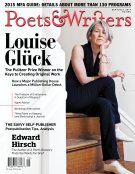Officially, 0s&1s Novels (www.0s-1s.com) is a new independent publisher and distributor of digital literary fiction. But in the context of the ongoing e-book pricing war between some of bookselling’s biggest players—for example, the current battle between Amazon and Hachette, and the recent lawsuit involving Apple and the Big Five publishers—this new start-up offers an indication that maybe the so-called rules of e-book publishing, and the large corporations who are making them, need not shape the digital future.
The brainchild of former advertising professional Andrew Lipstein, 0s&1s was launched this past June as one answer to the question of what book publishing and selling should look like in the Internet age—and, perhaps more pressing, how authors and booksellers should get paid. “When each decision is made based on the previous landscape, you get into holes like the one we’re currently in,” Lipstein says, referring to the publishing industry’s rocky adjustment to the rise of digital media, and the resulting conflict over pricing and payment. “Bookselling is not as successful as it could be, given the passion of readers.” So, late last year, when a friend of his who had written her first novel was having trouble navigating the publishing world, Lipstein tried to figure out what an optimal exchange of digitized literature for money would be.
The result was 0s&1s, which is both a digital publisher and a distributor of e-books published by twenty-seven different independent presses in the United States and Canada—including Black Balloon Publishing, Coach House Books, Red Hen Press, and Tin House Books—offering each title for the flat price of six dollars. Each purchase includes a bundle of the three most common e-book formats (ePub, mobi, and PDF) delivered to the reader without digital rights management restrictions, meaning that unlike e-books purchased through Amazon and most other retailers, titles purchased through 0s&1s belong to and can be shared by customers without limitation or additional cost, the way one might share a print book.
As a publisher, 0s&1s has a small team of volunteer editors, led by Lipstein himself, who review submitted manuscripts and work directly with authors on the content before bringing in a copyeditor for final polishing. Lipstein believes that the publishing status quo is one of overediting, and that associated costs can condemn a work to financial failure from the get-go while often stripping a first novel of something subtle and precious, “a raw feel that you’ll never get again with that author.” This minimization of publishing costs is part of how Lipstein keeps his overhead low and is able to offer large author royalties: Of those six dollars per copy, 20 percent goes to the seller, and 80 percent goes to the author and (if applicable) partner publisher—more than both the industry standard for e-books, which is typically 25 percent, and Amazon’s Kindle Direct Publishing, which offers up to 70 percent.
Lipstein isn’t particularly motivated by money, and, as such, has set up a business that doesn’t actually need much revenue to remain solvent. “Just ignore the way books are [traditionally] sold and think, ‘Someone has a website and sells other people’s books through it. What amount of money is fundamentally fair for that person to make?’” he asks. “If I were to answer honestly, I would say even less than 20 percent. For digital books, it’s just a simple interchange between information and money. We’re literally just sending the buyer a series of zeros and ones—weightless data—so I don’t think it’s fair for a retailer to take 25 percent, let alone 30, 40, 50—which is what’s been happening.”
Rachel Lieff Axelbank lives in New York City and Hawaii.








